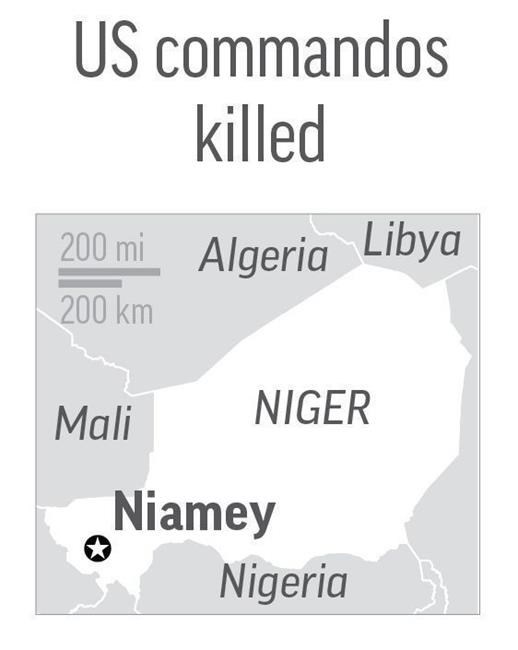Lolita C. Baldor And Dalatou Mamane

NIGER COMMANDOS 100517: Map locates Niamey, Niger, where 3 US commandos were killed; 1c x 2 1/2 inches; with BC-US--United States-Niger; JEM; ETA 7 a.m. SOURCE: maps4news/HERE, U.S. Africa Command. Editor’s Note: It is mandatory to include all sources that accompany this graphic when repurposing or editing it for publication
Republished October 05, 2017 - 3:08 PM
Original Publication Date October 04, 2017 - 4:56 PM
WASHINGTON - Islamic State-linked militants may have been responsible for the ambush in southwestern Niger that killed three U.S. Army special operations commandos and several local Niger forces, U.S. officials said Thursday.
Wednesday's attack came after U.S. and Niger forces met with local tribal members about 200 kilometres (120 miles) north of Niger's capital, Niamey, near its border with Mali. Two American troops were wounded.
Niger's President Mahamadou Issoufou said several of his nation's soldiers died in the attack, blaming it on Mali-based Islamic extremists near Niger's village of Tongo-Tongo in the Tillaberi region.
"Our country is once again the target of a terrorist attack, with a large number of victims," he said.
Some officials originally suspected the attack was the work of al-Qaida in the Islamic Maghreb.
But Americans official said Thursday the U.S. now has reason to believe it was extremists affiliated with IS. They spoke on condition of anonymity because they were not authorized to discuss the incident publicly.
At a Pentagon press conference Thursday, Lt. Gen. Ken McKenzie, director of the U.S. military's Joint Staff, declined to provide many details of the attack, saying operations were still ongoing.
McKenzie said he was not prepared to say whether IS was increasing its presence in the region or if it was responsible for the attack. He said that as campaigns against IS in Iraq and Syria gain success, "it is inevitable that people will try to go ... to other places." Those include the Maghreb, where Niger is located.
Asked whether the U.S. forces had adequate protection, including readily available medical evacuation, McKenzie said rapid evacuation is a primary concern when developing any U.S. mission.
A number of Islamic extremist groups, including al-Qaida in the Islamic Maghreb, operate in the region and sporadically launch cross-border raids. Despite the intervention of French troops in 2013 that pushed the extremists from their strongholds in northern Mali, they continue attacks. Boko Haram, based south in Nigeria, has also staged several attacks in Niger.
The two wounded U.S. service members were evacuated in stable condition to Landstuhl Regional Medical Center in Germany, U.S. Africa Command said in its statement.
McKenzie wouldn't provide details on the evacuation of the U.S. Green Berets or if the Pentagon met its goal of getting wounded troops out within an hour of their injuries. A U.S. official said the wounded were taken out by a U.S. aircraft.
U.S. special operations forces have been routinely working with Niger's forces, helping them to improve their abilities to fight extremists in the region. That effort has increased in recent years, said McKenzie.
"I would say that over the last few years we have increased our military presence in that country," said McKenzie. "Niger is an important partner of ours. ... We have a great opportunity there to do train, advise, assist, to do a variety of things with them to help them stand on their own two feet."
The White House said President Donald Trump was notified about the attack Wednesday night as he flew aboard Air Force One from Las Vegas to Washington.
Mali, Mauritania, Niger, Burkina Faso and Chad are putting together a 5,000-strong G5 Sahel force to fight the growing threat from extremists in the vast Sahel region. The first units are expected to deploy in October and all battalions should be on the ground by March 2018.
The Security Council unanimously adopted a resolution in June welcoming the deployment, but at U.S. insistence it did not include any possibility of U.N. financing for the force.
The countries have been pressing the international community to help with equipping troops and ensuring their mobility and to help with logistics, communications and protection in the field.
That force will operate in the region along with a 12,000-member U.N. peacekeeping mission in Mali, which has become the deadliest in the world for U.N. peacekeepers, and France's 5,000-member Barkhane military operation, its largest overseas mission.
___
Mamane contributed to this story from Niamey, Niger. AP journalist Carley Petesch in Dakar, Senegal, contributed to this report.
News from © The Associated Press, 2017